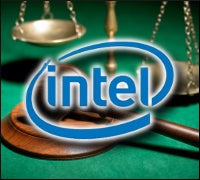 |
New York Attorney General Andrew Cuomo filed a federal antitrust lawsuit Wednesday against Intel, accusing the world’s largest chip maker of violating state and federal antitrust laws by misusing its leadership position to stifle sales of rival AMD.
The suit comes nearly two years after Cuomo started his own investigation. This is all familiar territory for Intel (NASDAQ: INTC), as it has faced similar charges in Japan, Korea and Europe.
The problem for Intel is that it has lost all three cases, though Japan declined to fine the company and Korea only fined it $25 million. Europe, on the other hand, fined the company $1.45 billion. Intel is currently appealing that ruling.
The New York case is also similar to the Asian and European cases in that it zeros in on Intel’s use of marketing initiatives as a form of arm-twisting. According to the allegations, the thinking goes something like this: Use our chips, we’ll give you the money. But use AMD chips, you don’t get anything.
Intel gives considerable amounts of money to OEMs to promote their products; as much as half of an OEM’s marketing budget may come from Intel.
“Rather than compete fairly, Intel used bribery and coercion to maintain a stranglehold on the market,” Cuomo said in a statement. “Intel’s actions not only unfairly restricted potential competitors, but also hurt average consumers who were robbed of better products and lower prices.”
The New York attorney general’s suit is the first antitrust action against Intel since it settled a case with the Federal Trade Commission in 1999. The FTC opened a new investigation of Intel in 2008, but has not begun any formal proceedings against the company.
AMD filed an antitrust suit against Intel in 2005. As usual, justice moves considerably slower than the release cycles of tech companies. That trial is set to begin in Delaware this coming March.
As part of the announcement of its case, the New York AG’s office released letters between Intel and OEMs as examples of the case against the chipmaking giant. The letters are dated as far back as 2003 and repeatedly misspell Intel CEO Paul Otellini’s surname.
Some are pretty vague. One internal e-mail from an unidentified Intel executive in April 2006 reads, “Let’s talk more on the phone as it’s so difficult for me to write or explain without considering antitrust issue.”
Others are downright harsh. An internal Dell e-mail from February 2004 discusses the possibility of Dell picking up AMD product and possible repercussions.
It reads: “PSO/CRB [Intel CEO Paul Otellini and Intel Chairman Craig Barrett] are prepared for jihad if Dell joins the AMD exodus. We get ZERO [rebates] for at least one quarter while Intel ‘investigates the details’ — there’s no legal/moral/threatening means for us to apply and avoid this.”
But the e-mails also don’t tell the whole story, Intel spokesman Chuck Mulloy argued.
“Between 2005 [when AMD filed its suit against Intel] and now, the parties have exchanged 200 million pages of documents. Between June and now, more than 2,200 hours of depositions have been taken. Tens of thousands of pages of expert reports have been submitted to the courts. A pretrial conference with the judge has been scheduled for mid-December. The trial begins on 29 March. So it’s not surprising we disagree with the New York attorney general. We will defend ourselves,” he told InternetNews.com.
[cob:Special_Report]Mulloy said Intel also considers the New York filing a duplication of the AMD case.
“The only difference is he has some evidence that may or may not appear in the trial in Delaware in a few months,” he said.
Tom McCoy, executive vice president for legal, corporate and public affairs at AMD, sees it differently.
“The New York attorney general’s 83-page complaint, filed on behalf of New York State consumers and governmental entities, details explicit evidence of Intel’s harm to U.S. consumers and computer manufacturers,” he said in a statement e-mailed to InternetNews.com. “Stopping that illegal harm will serve the settled purpose of the American antitrust laws: ensuring that innovation is unconstrained and competition is free to serve consumers.”
Martin Reynolds, research vice president with Gartner, said the problem with many of the e-mails is that they can be read as either damning or inoffensive.
“One complaint is Intel has a program in place to train its people not to violate antitrust laws, but the complaint is that it taught them how to violate the antitrust laws and cover them up by careful use of language and not committing to e-mail and notes,” he said. “Which one do you believe?”
There’s too much ambiguity and too many unknowns, he added. Everything listed features unnamed executives, so readers don’t know if whether the sender is an overenthusiastic sales person or a C-level executive.
“Both sides will give you an argument as to why they are correct,” Reynolds said.
But whatever happens, Reynolds added that it doesn’t change the fact that AMD is a company lagging competitively and needs to close the performance gap with Intel
“All this activity will not shift the competitive landscape of processors one bit, and if Intel shifts its innovation and rate of advancement, then Intel will suffer the same thing it did in 2006 when it lost market share to AMD,” he said.


